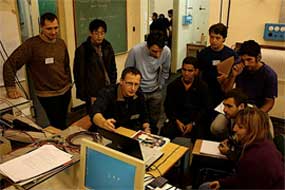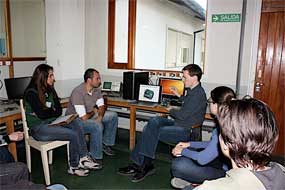The ICFA2010 School/Workshop on Instrumentation in Elementary Particle Physics, Bariloche, Argentina, January 11-22, 2010
Marleigh Sheaff
Eighty-one graduate students, 67 of them from countries in the Americas, participated in ICFA2010, which was held at the Institute Balseiro at the Center for Atomic Physics in Bariloche, Argentina. This was the latest in the series of very successful biennial schools/workshops that was initiated in the late 1980's by the ICFA Panel on Instrumentation, Innovation, and Development. This quality educational program is unique. In addition to being presented with lecture courses and topical seminars, the students have the opportunity to participate in “hands-on" laboratory sessions in small groups working with their peers from different countries. The laboratory setups are much the same as those used in advanced university laboratory courses or by research groups when prototyping detectors. Their participation allows the students to develop valuable skills as well as to gain confidence in working with apparatus.


Photo credit: Ariella Cattai, Chair of the ICFA Panel on Instrumentation
Working so closely with students from a variety of other countries provides U.S. students with international experience early in their careers. This is invaluable preparation for their participation in the large international experimental efforts that are the norm today. The number of applications to ICFA2010 from U.S. students was larger than for previous ICFA Schools/Workshops, which indicates that the students themselves recognize the value of international exposure.
The lecture program presented covered all major detector systems used in accelerator-based particle physics experiments. These in-depth presentations were given by recognized experts in detector research and development. They included many details about each of the various detector systems including their expected performance. A good understanding of detectors is necessary for the correct interpretation of experimental data in performing analysis. It is also needed by the upcoming generation of experimentalists so that they will have the capability of designing and building apparatus for the experiments of the future. Several seminars were presented that described the application of detectors either inside or outside of particle physics experiments, e.g., for use in medicine.
The quality of all presentations was well above average. In answer to the questionnaire they filled out at the end of the event, student participants rated them as being at about the right level and very important for them in their future careers. Congratulations are due to Xavier Bertou, school director, and the others on the local organizing committee for the organization of this very successful event. More details are available on the ICFA2010 Web Site.
Marleigh Sheaff is a Senior Scientist Emeritus in the Physics Department at the University of Wisconsin.
Disclaimer - The articles and opinion pieces found in this issue of the APS Forum on International Physics Newsletter are not peer refereed and represent solely the views of the authors and not necessarily the views of the APS
